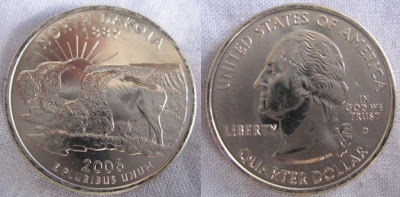Oklahoma state quarter
 The Oklahoma quarter features an image of the State bird, the Scissortail Flycatcher, in flight with its distinctive tail feathers spread. The bird is soaring over the State wildflower, the Indian Blanket, backed by a field of similar wildflowers. The coin's design also bears the inscriptions "Oklahoma" and "1907."
The Oklahoma quarter features an image of the State bird, the Scissortail Flycatcher, in flight with its distinctive tail feathers spread. The bird is soaring over the State wildflower, the Indian Blanket, backed by a field of similar wildflowers. The coin's design also bears the inscriptions "Oklahoma" and "1907."The depiction of Indian Blanket (or Gaillardia) symbolizes the State's rich Native American heritage and native long grass prairies that are abundant in wildlife. Oklahoma was formed by the combination of the Oklahoma Territory and the Indian Territory of the Five Civilized Tribes: Choctaw, Chickasaw, Creek, Seminole, and Cherokee. The State's name is derived from the Choctaw words "okla" and "homma," meaning "red" and "people."
Ohio state quarter
 The Ohio quarter honors the state's contribution to the history of aviation, depicting an early aircraft and an astronaut, superimposed as a group on the outline of the state. The design also includes the inscription "Birthplace of Aviation Pioneers".
The Ohio quarter honors the state's contribution to the history of aviation, depicting an early aircraft and an astronaut, superimposed as a group on the outline of the state. The design also includes the inscription "Birthplace of Aviation Pioneers".The claim to this inscription is well justified, the history making astronauts Neil Armstrong and John Glenn were both born in Ohio, as was Orville Wright, co-inventor of the airplane. Orville and his brother, Wilbur Wright, also built and tested one of their early aircraft, the 1905 Flyer III.
North Dakota state quarter

The North Dakota quarter depicts a pair of grazing American bison in the foreground with a sunset view of the rugged buttes and canyons that help define the State's Badlands region in the background.
President Theodore Roosevelt founded the United States Forest Service and signed the Antiquities Act in 1906, which was designed to preserve and protect unspoiled places such as his beloved North Dakota Badlands, now known as Theodore Roosevelt National Park. Herds of American Bison thundered across the Badlands through the 1860s. The park is now home to more than 400 wild buffalo, an animal once on the brink of extinction.



No comments:
Post a Comment